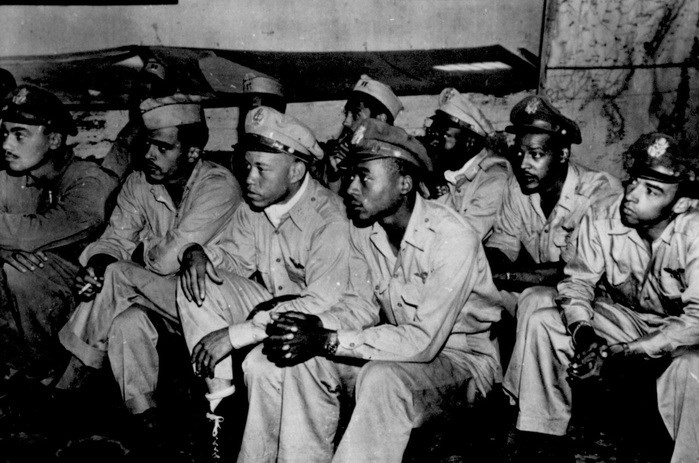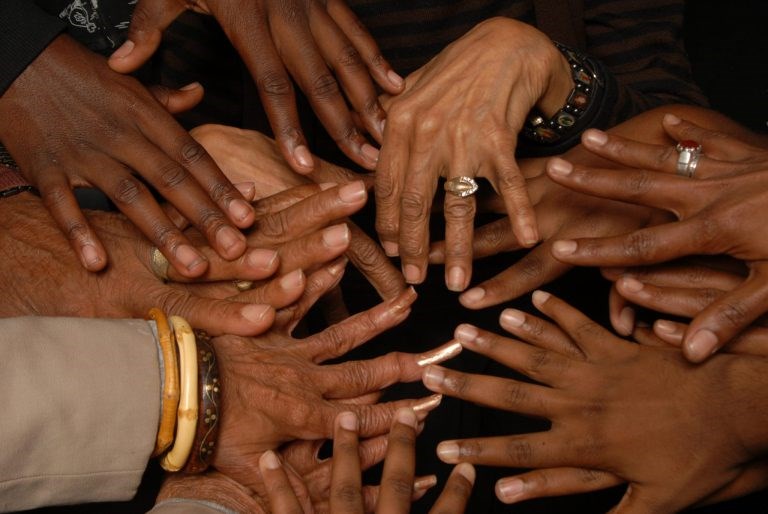
By Monica L. Williams and Stefanie Siegel as told to Karen Malpede
"Down the rabbit hole," is how producer-director Monica L. Williams likes to describe the several years journey of unearthing hidden stories of black veterans and black veteran citizens of Bedford-Stuyvesant.
"Authentic stakeholders" in the neighborhood is how Williams describes those who are the inspiration for a new theater piece, "As Quiet as It's Kept," produced by Bailey's Café. "As Quiet as It's Kept," will premier on November 11th at Bailey's Cafe, 324 Malcolm X Boulevard in Bedford-Stuyvesant.
[perfectpullquote align="full" cite="" link="" color="" class="" size=""]Bailey's, it might be said, is the place where the untold story can be told and heard[/perfectpullquote]
There will be three performances: 3 PM , 5 PM & 7 PM, each followed by a talk back with audience members. The audience for each performance will be limited to 25 people in order to allow for the artists to move freely through the space and to keep the intimacy of the experience. To purchase tickets, go here.
Six artists working in different mediums will premiere interrelated individual creations on themes of service and survival that director Williams will mesh into a collaborative, interactive, multimedia and immersive work of art for and from the community.
[perfectpullquote align="full" cite="" link="" color="" class="" size=""]Williams is the creator of "Other Women," a recent hit at Joe's Pub at the Public Theater and soon to be featured at TEDWomen November 1-3, 2017 in New Orleans.[/perfectpullquote]
"The piece mixes realism with magical realism and spiritual realism," Williams says. "It is a mixture of the familiar and the fantastical, which is how I think of theater." A producing director outside of Bailey's, Williams is the creator of "Other Women," a recent hit at Joe's Pub at the Public Theater and soon to be featured at TEDWomen November 1-3, 2017 in New Orleans. "Other Women," in turn, is part of her epic-in-progress "Love Hustle" a collection of 13 original pieces "exploring tensions of pursuing a creative life." This first part is "about two women writers who lean on their sisterhood to endure the ebb and flow of life, love and career," Williams explains.
For "As Quiet as It's Kept" Williams created the outline of a character called "Servant", who lives in Bed-Stuy; the piece is set in1959 and 2017. Non-gender specific, the idea of service, as in serving the community, is central to the character's identity —six individual artists will be rendering, through sound, dance, acting, movement, and images their own "iterations" of exactly who Servant is. Servant's journey is inspired by the real-life stories of four long-time Bed-Stuy residents who have lived in the neighborhood during the last half-century, two women veterans of the community and two men who are US army veterans.

"As Quiet as It's Kept" is a weave of memories, tales and experiences of these four people who have been anchors in the community. These stories have been given to the six artists: Anna Pond (actress/writer), Michael Hill (musician;lyricist/vocalist); Zoe Flowers (poet/actress), Kadeem Alston Roman (choreographer/dancer/actor and long-time teaching artist at Bailey's), D.J. Reborn (sound designer/"great mother") and Robyn Twomey (photographer). Each artist works alone, then the group comes together to eat, drink, rehearse and share, with Williams serving as outside eye, the director of this community inspired, community-made theater piece.
Fueling the work of Williams and her artistic team as they collectively create "As Quiet as It's Kept" is the irrepressible energy of Stefanie Siegel, founder, director and visionary of Bailey's Café, located since March 2015 on Malcolm X between Decatur and Bainbridge in Bed-Sty. Bailey's began as Siegel's dream of what real, community-based education might be like. She was teaching English at Paul Robeson High School, one of the venerable and large schools closed by former-Mayor Bloomberg. Frustrated by the limits of traditional education, she began to bring students and elders together to exchange stories and services, community gardening and healthy eating.
[perfectpullquote align="right" cite="" link="" color="" class="" size=""]"Many of the black vets have what is called 'bad paper,'" Siegel says. "There was so much racism in the army, often the officers were from the South, that the black enlisted men were regularly disciplined for reacting to a racial slur." [/perfectpullquote]
Through 651Arts, Siegel also brought numerous rising black artists into her classroom, many of whom remain on Bailey's staff as teaching artists, as do some of her former Robeson students. Bailey's takes its name from the Gloria Naylor's novel. It has been realized as an actual place by Siegel—a multi-use, constantly transforming and transformative storefront for inter-generational, learning and giving. Bailey's hosts regular performances by a roster of musicians, a French immersion preschool, and other activities for the community.
Siegel with several Bailey's artists gathered stories from members of the Black Veterans Organization in Brooklyn, most of whom fought in Vietnam. Invited into their group by a veteran, Herbert Sweat, with whom Bailey's has a longtime relationship, Siegel read Tim O'Brien's Vietnam classic The Things We Carried, out-loud and taped the black vet's responses over several months. Sweat, who is the natural storyteller in the group, tends to be the voice most often heard.
The title "As Quiet as It's Kept" comes from a phrase he repeats often, as it leads to the telling of something important that is not well known. Listening, over and over to these hours of tapes Williams says was "like going down the rabbit hole" there was so much there, and yet so much that seemed unable or unwilling to be said to a non-veteran listener, that while the veterans' stories could serve as inspiration, it seemed impossible to turn them into a coherent work.
"Stefanie and I came to realize that we were not authentic stakeholders in the veterans' stories," said Williams. "We were women; Stefanie is a white woman. Neither one of us had not served in the army."
"Many of the black vets have what is called 'bad paper,'" Siegel says. "There was so much racism in the army, often the officers were from the South, that the black enlisted men were regularly disciplined for reacting to a racial slur." "Bad paper," a level up from a Dishonorable Discharge, is also a designation granted by the Armed Forces to keep veterans from accessing all the services available to those who have "honorably" served, and the over-use of this sort of discharge had been widely critiqued.
Another veteran with "bad paper," though he was in the army between the Korean and Vietnam wars and didn't see combat, is Lawrence James, a long-time Bed-Sty resident who became one of the models for the Servant character. Like Sweat, James was born in Bed-Stuy and has always maintained a connection to the neighborhood, although he discovered his mother had relocated to Brownsville when he returned from the service in 1964.

Williams and Siegel realized the black veterans' stories of survival intersected with a broader story of survival and service, that of people who had lived in Bedford-Stuyvesant for years. As Bailey's settled into its first home on Malcolm X, we started to meet members of the community who practiced "being of service" in a different way. For example, Ms Marian and Ms Franklin, also longtime residents of Bed-Sty and leaders of their block association, came to share memories with the artists through our community engagement gatherings. Their stories are now part of the fabric of AQAIK.
Another community-generated resource being used as inspiration for "As Quiet as It's Kept" called "The Framing Project". These are white cardboard picture frames placed around Bailey's Café itself, posing questions and inviting written responses from anyone. "What is your warrior stance?" "Who's got your back and whose back do you have?" "How do you feel when you serve your community?" Some responses: "My great-grandmother Channie." "I will put my life on the line for women's health." "Bailey's Café and all its partners."
The secret to Bailey's collective genius is expressed in the multiplicity of voices and unique talents coming together to generate "As Quiet as It's Kept." Bailey's, it might be said, is the place where the untold story can be told and heard and where the wealth of the talents of the community might be fused into irrepressible examples of the "familiar and the fantastic" by the guiding visions of Monica L. Williams and Stefanie Siegel, collaborators.
The first iteration of "As Quiet as It's Kept," a result of years of this intersecting exploration of lives and visions, promises the rare excitement that only a truly unique experimental space like Bailey's is able to provide—a community created and shared arts event unlike any other.



